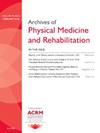Self-management Programs Within Rehabilitation Yield Positive Health Outcomes at a Small Increased Cost Compared With Usual Care: A Systematic Review and Meta-analysis
IF 3.6
2区 医学
Q1 REHABILITATION
Archives of physical medicine and rehabilitation
Pub Date : 2024-10-01
DOI:10.1016/j.apmr.2024.05.007
引用次数: 0
Abstract
Objective
To determine if self-management programs, supported by a health professional, in rehabilitation are cost effective.
Data Sources
Six databases were searched until December 2023.
Study Selection
Randomized controlled trials with adults completing a supported self-management program while participating in rehabilitation or receiving health professional input in the hospital or community settings were included. Self-management programs were completed outside the structured, supervised therapy and health professional sessions. Included trials had a cost measure and an effectiveness outcome reported, such as health-related quality of life or function. Grading of Recommendations, Assessment, Development, and Evaluations was used to determine the certainty of evidence across trials included in each meta-analysis. Incremental cost-effectiveness ratios were calculated based on the mean difference from the meta-analyses of contributing health care costs and quality of life.
Data Extraction
After application of the search strategy, two independent reviewers determined eligibility of identified literature, initially by reviewing the title and/or abstract before full-text review. Using a customized form, data were extracted by one reviewer and checked by a second reviewer.
Data Synthesis
Forty-three trials were included, and 27 had data included in meta-analyses. Where self-management was a primary intervention, there was moderate certainty of a meaningful positive difference in quality-of-life utility index of 0.03 units (95% confidence interval, 0.01-0.06). The cost difference between self-management as the primary intervention and usual care (comprising usual intervention/therapy, minimal intervention [including education only], or no intervention) potentially favored the comparison group (mean difference=Australian dollar [AUD]90; 95% confidence interval, −AUD130 to AUD310). The cost per quality-adjusted life year (QALY) gained for self-management programs as a stand-alone intervention was AUD3000, which was below the acceptable willingness-to-pay threshold in Australia per QALY gained (AUD50,000/QALY gained).
Conclusions
Self-management as an intervention is low cost and could improve health-related quality of life.
与常规护理相比,康复项目中的自我管理计划只需增加少量成本就能产生积极的健康效果:系统回顾和荟萃分析。
目标:确定由医疗专业人员支持的康复自我管理计划是否具有成本效益:确定在医疗专业人员支持下的康复自我管理计划是否具有成本效益:研究选择:随机对照试验:包括在医院或社区环境中,成人在参与康复治疗或接受医疗专业人员指导的同时完成自我管理计划的试验。自我管理计划是在有组织、有监督的治疗和医疗专业课程之外完成的。纳入的试验均有成本衡量标准和有效性结果报告,如与健康相关的生活质量或功能。推荐、评估、发展和评价分级法(GRADE)用于确定每项荟萃分析所纳入试验的证据确定性。根据医疗成本和生活质量荟萃分析的平均差异计算增量成本效益比(ICERS):采用检索策略后,由两名独立审稿人确定已识别文献的资格,首先审阅标题和/或摘要,然后再审阅全文。一名审稿人使用定制的表格提取数据,并由另一名审稿人进行检查:共纳入 43 项试验,27 项试验的数据被纳入荟萃分析。在以自我管理为主要干预措施的情况下,生活质量效用指数的有意义正差异为 0.03 个单位(95% CI 0.01 至 0.06),这一点已基本确定。将自我管理作为主要干预措施与常规护理(包括常规干预/治疗、最小干预(仅包括教育)或无干预)之间的成本差异可能有利于对比组(MD 90 澳元,95% CI - 130 澳元至 310 澳元)。作为一项独立干预措施,自我管理项目每获得一个质量调整生命年(QALY)的成本为3000澳元,低于澳大利亚每获得一个质量调整生命年可接受的支付意愿阈值(50000澳元/质量调整生命年):自我管理作为一种干预措施成本较低,可改善与健康相关的生活质量:CRD42021275472。
本文章由计算机程序翻译,如有差异,请以英文原文为准。
求助全文
约1分钟内获得全文
求助全文
来源期刊
CiteScore
6.20
自引率
4.70%
发文量
495
审稿时长
38 days
期刊介绍:
The Archives of Physical Medicine and Rehabilitation publishes original, peer-reviewed research and clinical reports on important trends and developments in physical medicine and rehabilitation and related fields. This international journal brings researchers and clinicians authoritative information on the therapeutic utilization of physical, behavioral and pharmaceutical agents in providing comprehensive care for individuals with chronic illness and disabilities.
Archives began publication in 1920, publishes monthly, and is the official journal of the American Congress of Rehabilitation Medicine. Its papers are cited more often than any other rehabilitation journal.

 求助内容:
求助内容: 应助结果提醒方式:
应助结果提醒方式:


